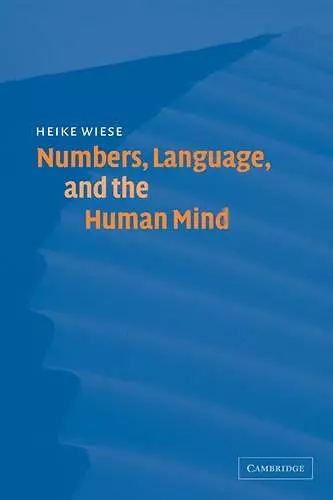Numbers, Language, and the Human Mind
Format:Paperback
Publisher:Cambridge University Press
Published:9th Apr '09
Currently unavailable, and unfortunately no date known when it will be back
This paperback is available in another edition too:
- Hardback£110.00(9780521831826)

This 2003 book discusses the relationship between numerical thinking and the human language faculty.
This 2003 book discusses the relationship between numerical thinking and the human language faculty, providing psychological, linguistic and philosophical perspectives on number, its evolution and its development in children.What constitutes our number concept? What makes it possible for us to employ numbers the way we do; which mental faculties contribute to our grasp of numbers? What do we share with other species, and what is specific to humans? How does our language faculty come into the picture? This 2003 book addresses these questions and discusses the relationship between numerical thinking and the human language faculty, providing psychological, linguistic and philosophical perspectives on number, its evolution and its development in children. Heike Wiese argues that language as a human faculty plays a crucial role in the emergence of systematic numerical thinking. She characterises number sequences as powerful and highly flexible mental tools that are unique to humans and shows that it is language that enables us to go beyond the perception of numerosity and to develop such mental tools.
'Heike Wiese builds the case for numerical cognition growing out of the symbolic cognition at the base of language - not as a parasitic spin-off, or a mere naming of numerical concepts, but as an ability whose roots extend to the same underlying cognitive operations. This account of the cognitive basis of number concepts is breathtaking in its synthetic scope, impeccable in its thoroughness of analysis, and stunning in its originality. It breaks new ground in bringing the rich history of mathematical-philosophical analyses into clear correspondence with recent cognitive-science investigations of reasoning about and acquiring numerical knowledge, and it brings insights from both paradigms to illuminate the mystery of the evolutionary and semiotic origins of number. Out of this effort to find a new synthesis have emerged a number of remarkable insights - about the nature of the precursors to number concepts in animal cognition, the origins and basis for the special human capacity for systematic numerical cognition, and the relationships between mathematical thinking and symbolic-linguistic abilities. Each of these could stand alone as the initiator of a whole body of further research (and likely will). But the book offers something more than this. Heike Wiese's book is proof that a work of theoretical rigor and scientific originality can be presented in unassumingly lucid prose, accessible to anyone with a serious curiosity about the nature of mathematical knowledge.' Terrence Deacon, University of California, Berkeley
'An elegant and witty integration of mathematics, psychology, and linguistics, Heike Wiese's new book offers an important advance in explicating the cognitive foundations of number. Wiese rigorously demonstrates how the uses of numbers for counting, ordering, and naming arise through the interaction of prelinguistic capacities with the expressive power of the language faculty, confirming in detail a hypothesis that has been in the air for some years now. Not only that, she makes it fun. I couldn't put the book down.' Ray Jackendoff, Brandeis University
'A refreshing and engaging investigation of the relationship between language and our human capacity for numerical thought. Wiese does a wonderful job of laying out the elaborate and many-layered connections between different kinds of number concepts, symbolic systems for representing and manipulating number (including but not limited to natural language), and the fundamental categories by which we understand the world - objects, subjects, and events. This book will appeal to anyone interested in numerical cognition or in the relationship between language and thought. Karen Wynn, Yale University
'This book is sure to become a classic in its field. … it provides an impressive synthesis of findings and leading ideas across multiple fields, including the philosophy of mathematics … an invaluable reference work for virtually anyone interested in 'exploring the distinctive way in which numerical cognition is intertwined with the human language faculty. … W's rich and impressive work is going to be essential reading for many years to come.' Language
- Winner of Susanne K. Langer Award for Outstanding Scholarship in the Ecology of Symbolic Form 2005
ISBN: 9780521108652
Dimensions: 229mm x 152mm x 20mm
Weight: 530g
360 pages